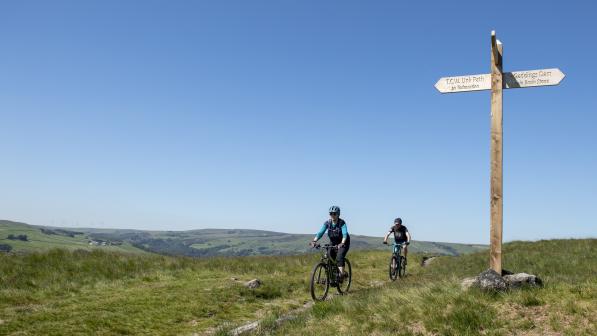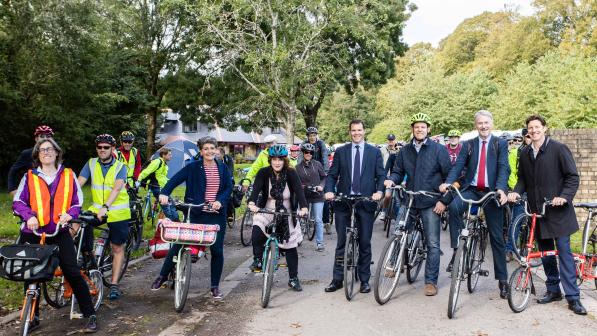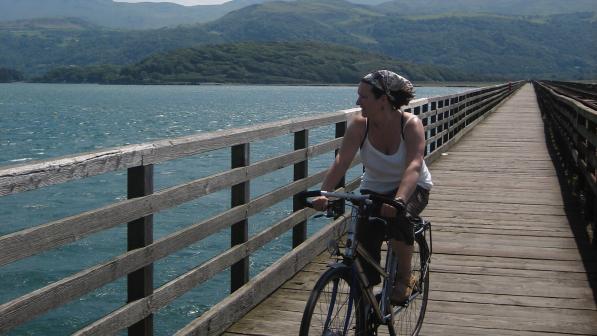Choosing the right path to make Wales a cycling nation

Cycling, for me, has always been a topic of conversation. My main mode of transport, the way I spend much of my free time, a cause for campaigns and calls to action.
Over the last year I have been joined by many more people keen to get involved in the both the conversation and the activity. If we are to see Wales become an active travel nation, we need people who are new to cycling or who don’t ride bikes for whatever reason, to join us in the call for investment and prioritization of cycling provision.
Only then, when politicians see that most people want liveable neighbourhoods and to enjoy segregated or traffic free routes connecting communities, will we see delivery on the promises that are made in the laws and strategies - but not so often seen on the ground.
Car free cycling
Living in Cardiff, every time I went out on my bike, or walked into the city centre in the spring and summer of last year, I would see people of all ages on their bikes, enjoying the quieter roads and relishing the opportunity to breathe the cleaner air.
I met friends who were physios and carers positively enjoying their commutes as they felt safe on roads that in ordinary times were congested and unpleasant.
Those of us who cycle regularly appreciated being able to continue to ride our bikes, get more familiar with our local lanes and create routes which kept us interested - yet not too far from home. We missed our sociable club rides and cafe stops for much of the year, but those we managed we truly appreciated, and we'll have those again.
The need for social distancing, and so many people's desire to make the most of our permitted time outside brought into sharp focus the disproportionate amount of space given over to motor vehicles in our towns and cities. So we campaigned for more space to be given over to walking and cycling, and the Welsh government soon came up with the money.
Local Authorities across Wales had the opportunity to put temporary measures in place to accommodate people moving around. Delivery was not as widespread as it could have been, but it did get people talking about what was needed to enable active travel, and gave us cycle campaigners hope that a different way of thinking about transport might be possible.
The draft Transport Strategy was launched and placed walking and cycling at the top of the transport hierarchy. We worked with the Welsh government and other stakeholders on this draft and submitted a detailed response to influence further.
The Burns commission report following the decision not to build the M4 relief road again gave us cause to celebrate the part we had played in a successful campaign which has resulted in a commitment to invest in active travel and sustainable transport rather than roads. Were the Welsh government starting to have the courage of their convictions?

Still some way to go
And then, to remind us that for too many of those in positions of power, roads still rule, we saw a plan to build a major road through some of our loveliest countryside reemerge and be presented as though there were no other option. No account was taken of peoples desire lines and community connections in the Vale of Glamorgan.
The long term impact of the health and wellbeing of our future generations hadn't been considered as this scheme would encourage more car journeys if it were to go ahead. Those completing the assement on which these decisions are made appeared to have taken a tick box approach to active travel.
Don't we all want to live in a Wales where the air is clean, we can hop on our bike to get to the shops, ride to see friends and family, or just get out there and enjoy cycling through the countryside?
Gwenda Owen, engagement officer for Wales, Cycling UK
We launched back into campaign mode and with many others, made it clear that this was not the Wales we wanted to see, nor was it a decision that had been made in line with the government's commitments to a create cleaner, greener Wales.
Working with experienced campaigner, Hugh Mackay, Cycling UK lead by example, drawing on our expertise and commitment to sustainable transport and active travel making it clear in our consultation response and campaign that we wanted to see government policies put into place when decisions were being made on government proposals.
A New Way Forward?
We waited. Then, last week Llwybr Newydd; the Wales Transport Strategy was launched, setting out the transport ambitions for the next 20 years, and priorities for the next five.
On the face of it, the strategy looks as though it contains much of what's needed to enable many more everyday journeys to be active journeys. It places walking and cycling at the top of the transport hierarchy, it sets impressive targets for modal shift and promises to introduce road user charging in a fair and equitable way.
However, the last transport strategy was also full of promise, and yet we still saw too many road building schemes pay scant regard to the governments stated ambitions, often sidelining active travel as being to hard to deliver.
Shortly after, the news filtered out that the Welsh government would not be funding the next stage of the Vale of Glamorgan's proposal for road building, (the reason given was that it was not in line with Lwybr Newydd), it was confirmed that they would not be proceeding. For the many hundreds of people who'd let the council know that building a major road off the M4 was not the transport solution that was needed, this was very welcome news.

So with the M4 decision favoring active and sustainable transport, and the Vale of Glamorgan being told in no uncertain terms that they cannot default to road building as a transport solution, are we seeing a change in thinking about how people can best move around Wales?
On 6 May, we go to the polls to elect the next Welsh Government - will whoever is elected keep these commitments? Will they invest the money in active travel? Will we see walking and cycling being put first when infrastructure is being proposed and developments planned?
On Tuesday, we held an Active Travel Hustings with Living Streets, where the candidates from the four main political parties demonstrated a remarkable level of cross-party support for active travel which was welcomed by us all. However, we know that the battle for long term consistent levels of spending is not yet won, we know that decisions can be reversed, priorities changed, and so we need to step up the campaign and show all candidates that cycling matters to voters.
If this is the Wales you want too, if you want cycling to be for everyone in Wales, make your voice heard by signing our petition.




